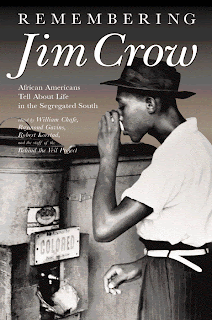Black History Month is meant to celebrate the culture and achievement of African-Americans, to remember or discover significant events like the civil rights movement, and to acknowledge the icons who sparked change in American society. And the necessary backdrop to the celebration is remembering where we've been as a country. George Santayana said, "T hose who cannot learn from history are doomed to repeat it." That's an interesting thought right now...especially since our country just elected our first African-American president. But to better understand where we are, we absolutely must remember how we got here.
hose who cannot learn from history are doomed to repeat it." That's an interesting thought right now...especially since our country just elected our first African-American president. But to better understand where we are, we absolutely must remember how we got here.
And that's why I love this book -- Remembering Jim Crow. It's one of my favorites. It's not a book of stiff, academic history. It's not a contrived, over-the-top work heavy on rhetoric but short on objectivity. What it is is a collection of oral histories of people who lived during the Jim Crow era...including what you already know and what never would have occurred to you.
When reading Jim Crow, the parts I found most compelling were those where the interviewees talked about the very, very subtle facets of racism and the de facto rules of social subordination. These are the parts of America's history that aren't written in textbooks. Here's an excerpt from an interview with a man named Ralph Thompson, who grew up in Tennessee in the late 1930's and early 1940's:
[Parents] tried to keep you away from things that would be embarrassing when they couldn't fight back.
...
When you look back at it, you can tell why -- because they couldn't defend [us].
...
My daddy, if it was a white person around talking to him in some kind of business format, he would move away from us or tell us to go play or something. I guess it was to protect us from something that might be said to him that he wasn't able to defend.
The book also gives us some glimpses of the subtle but real pressures put on white people in the segregated south:
I can remember at the drugstore, some evenings we would stop in there and get ice cream, and the pharmacist was real nice to us.Though often sad or even disgusting, this collection of stories will, at some point, lift you back up because you'll not only remember the downfalls, but see the future. Really...if you can make time to read one book this month, I give this one the highest marks and enthusiastically recommend it. Even if you don't have time to read the book right now, you can listen to parts of the interviews on the Internet at http://americanradioworks.publicradio.org.
...
In this particular drugstore he didn't put any stools at his counter. When you look back, I guess he said I'll treat you as fair as I can and if I don't put the stools here, I don't have to worry about nobody sitting down. You get your ice cream. You have to move on.





No comments:
Post a Comment